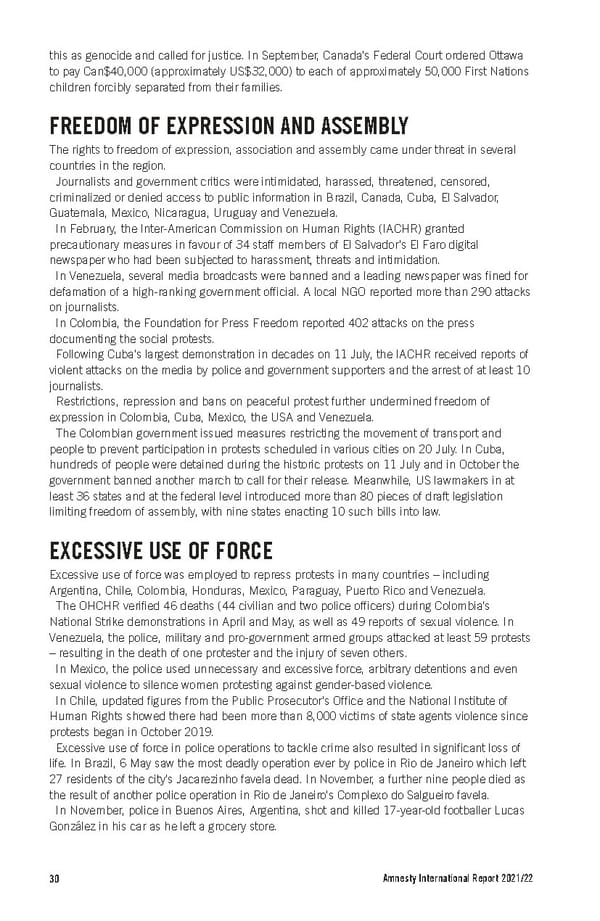this as genocide and called for justice. In September, Canada’s Federal Court ordered Ottawa to pay Can$40,000 (approximately US$32,000) to each of approximately 50,000 First Nations children forcibly separated from their families. FREEDOM OF EXPRESSION AND ASSEMBLY The rights to freedom of expression, association and assembly came under threat in several countries in the region. Journalists and government critics were intimidated, harassed, threatened, censored, criminalized or denied access to public information in Brazil, Canada, Cuba, El Salvador, Guatemala, Mexico, Nicaragua, Uruguay and Venezuela. In February, the Inter-American Commission on Human Rights (IACHR) granted precautionary measures in favour of 34 staff members of El Salvador’s El Faro digital newspaper who had been subjected to harassment, threats and intimidation. In Venezuela, several media broadcasts were banned and a leading newspaper was fined for defamation of a high-ranking government official. A local NGO reported more than 290 attacks on journalists. In Colombia, the Foundation for Press Freedom reported 402 attacks on the press documenting the social protests. Following Cuba’s largest demonstration in decades on 11 July, the IACHR received reports of violent attacks on the media by police and government supporters and the arrest of at least 10 journalists. Restrictions, repression and bans on peaceful protest further undermined freedom of expression in Colombia, Cuba, Mexico, the USA and Venezuela. The Colombian government issued measures restricting the movement of transport and people to prevent participation in protests scheduled in various cities on 20 July. In Cuba, hundreds of people were detained during the historic protests on 11 July and in October the government banned another march to call for their release. Meanwhile, US lawmakers in at least 36 states and at the federal level introduced more than 80 pieces of draft legislation limiting freedom of assembly, with nine states enacting 10 such bills into law. EXCESSIVE USE OF FORCE Excessive use of force was employed to repress protests in many countries – including Argentina, Chile, Colombia, Honduras, Mexico, Paraguay, Puerto Rico and Venezuela. The OHCHR verified 46 deaths (44 civilian and two police officers) during Colombia’s National Strike demonstrations in April and May, as well as 49 reports of sexual violence. In Venezuela, the police, military and pro-government armed groups attacked at least 59 protests – resulting in the death of one protester and the injury of seven others. In Mexico, the police used unnecessary and excessive force, arbitrary detentions and even sexual violence to silence women protesting against gender-based violence. In Chile, updated figures from the Public Prosecutor’s Office and the National Institute of Human Rights showed there had been more than 8,000 victims of state agents violence since protests began in October 2019. Excessive use of force in police operations to tackle crime also resulted in significant loss of life. In Brazil, 6 May saw the most deadly operation ever by police in Rio de Janeiro which left 27 residents of the city’s Jacarezinho favela dead. In November, a further nine people died as the result of another police operation in Rio de Janeiro’s Complexo do Salgueiro favela. In November, police in Buenos Aires, Argentina, shot and killed 17-year-old footballer Lucas González in his car as he left a grocery store. Amnesty International Report 2021/22 30
 Amnesty International Report 2021/22 Page 29 Page 31
Amnesty International Report 2021/22 Page 29 Page 31